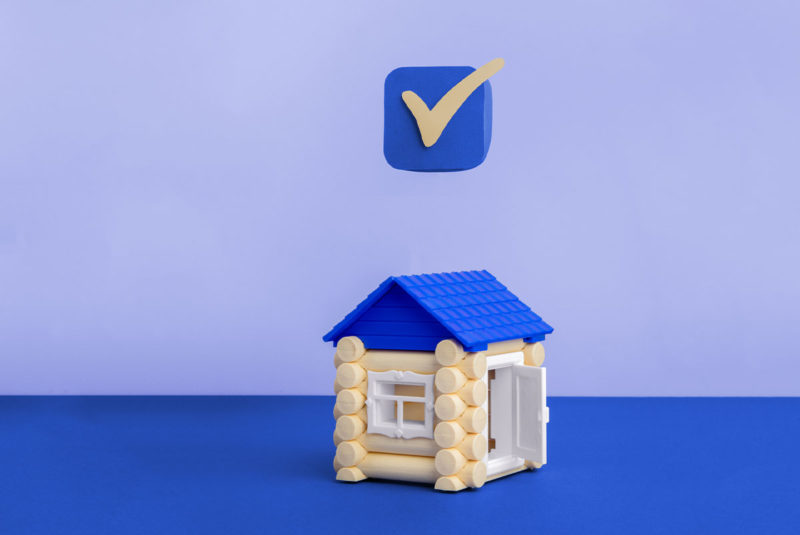Ready To Buy a Home?
Get Approved to Buy a Home
Rocket Mortgage® lets you get to house hunting sooner.
Are you thinking about selling your home to a cash buyer? If you’re deciding between an all-cash offer and a financed offer, are you wondering whether it makes a difference anyway? Either way you choose, you’ll still get paid, but selling your house for cash has unique rewards and risks.
Some owners want to sell their homes for cash because it can shorten the home buying timeline and fast-track closing. Other home sellers are fans of cash offers because they can sell their property as is and skip the hassle of painting, staging, repairing or renovating.
Whatever your reason, we’ll fill you in on everything you need to know to carry out a successful all-cash sale.
What Is a Cash Offer?
When a buyer makes a cash offer, they plan on purchasing a home without a mortgage, paying cash for the entire cost of the property upfront.
Anyone with enough money to cover the purchase price of a property is a cash buyer. But all-cash buyers are typically one (or more) of the following: in the market for a second home, investors, flippers or iBuyers.
Should You Sell Your House to a Cash Buyer?
Whether you should sell your house to a cash buyer (or not) depends on your goals. If you want to save money and time on staging, have a faster closing and minimize the chances of delays, a cash buyer might be ideal for you. But if your goal is to get the highest possible offer, you may be better off sticking with a traditional sale that comes complete with a mortgage.
Let’s do a quick rundown of the pros and cons.
PROS of Selling Your Home to a Cash Buyer👍
Cash offers can close faster than financed offers because you only wait on the title search to come back before you can close. Buyers with mortgages must wait on appraisals and approval of loan paperwork, which usually takes a few weeks.
Cash buyers usually ignore defects, clutter or wear and tear, so you won’t need to worry about staging or repairs. But that might not work with a traditional home buyer. They might get turned off by an unstaged home. Cash buyers often overlook everything besides significant repairs and defects.
Since cash buyers don’t have to worry about lender approval, you can rest easy knowing the deal won’t fall through if your home’s appraised value is lower than the seller’s purchase offer.
CONS of Selling Your Home to a Cash Buyer👎
There’s a reason cash buyers are willing to purchase your property as is, and it’s generally because it allows them to make lower offers. In most cases, buyers with home loans can make higher purchase offers because they may be able to borrow more money than the cash buyer’s offer.
Even though cash buyers can close faster and often without issue, an all-cash offer doesn’t guarantee a sale. Cash offers may come with an inspection contingency. And depending on the results, the buyer can back out of the deal scot-free. Whether your buyer wants to pay in cash or with a mortgage, there are no guarantees.
If you sell to a cash buyer before you list your home on the market, you’ll miss out on the chance to weigh competing bids.
How To Sell Your House for Cash
If you decide to sell your home for cash, you can use these steps to streamline the selling process:
1. Find out the value of your home
Knowledge is power. Before you look at any offers, find out how much your home is worth.
One of the fastest and easiest ways to learn your home’s value is to ask your real estate agent to put together a complimentary comparative market analysis (CMA). A CMA is a real estate agent’s valuation based on recent, comparable home sales in the area.
If you don’t plan on using a real estate agent or want a more formal estimate of your property’s value, you can hire a professional appraiser.
Cash buyers generally tend to make lower offers than buyers who are financing. They know their offers are more attractive to sellers because they come with fewer contingencies, don’t hinge on loan approval and can close faster than financed offers.
2. Generate cash offers
If time is not on your side, contact an iBuyer to get a cash offer on your home ASAP.
iBuyers like Opendoor, Offerpad and RedfinNow can make cash offers in as little as 24 hours. But many iBuyers charge processing fees, so make sure to factor these fees into your ultimate decision. All you’ll need to do is provide basic information about your home.
You can also generate cash offers by asking your real estate agent to target cash buyers. In late 2020, demand for housing skyrocketed, leading to a historic seller’s market. During this time, cash offers were everywhere. You may get a few cash offers in a more balanced housing market, but you shouldn’t expect a crowd of cash buyers to get into a bidding war over your property.
3. Avoid scams
When you’re reviewing cash offers, keep a watchful eye out for scams. There are many honest, reputable cash buyers, but scams are common in the real estate industry, and not every cash buyer is ethical.
Here are some tips to help you avoid falling victim to real estate scams:
- Don’t send money to anyone besides the title company
- Only use the wire instructions provided to you by the title company
- Be wary of out-of-town buyers or buyers who are unavailable to speak or meet
- Ask for references
- Ask for proof of funds
- Require a sizeable, nonrefundable deposit
- Trust your gut – if something doesn’t feel right, it probably isn’t
4. Review the cash buyer’s offer and terms
Carefully consider the terms of any cash offers you receive.
Any buyer’s written offer (aka purchase agreement) should include details like the sale price, the earnest money deposit, contingencies and the closing date.
When a cash buyer sends an offer, they should also include proof of funds to prove they have the money to buy the house. Serious cash buyers are typically willing to put down a larger escrow deposit that can equal 5% – 10% of the purchase price.
As you review offers, examine every aspect of the agreement, not just the purchase price. If you’re interested in a faster closing or don’t want to put any more time and energy into the home, you’ll want to make sure the terms of the purchase agreement align with your goals.
5. Conduct home inspection and title search
Once you’ve signed the purchase agreement, your buyer will schedule an inspection and run a title search. This is one step of the home buying process both cash buyers and financed buyers share. Where they differ is in the disclosures and potential hurdles en route to closing.
Traditional home buyers must wait until their lenders provide paperwork, like the Loan Estimate and Closing Disclosure, before they can close. Cash buyers are free to close once the title search is clear.
If the title search reveals a cloud on title, cash buyers will likely renegotiate but may be able to close if they agree to buy the house with encumbrances. If title defects are discovered during a title search for a traditional buyer, most lenders will deny the loan.
If there are liens or other encumbrances holding up closing, your attorney can help resolve these issues and clear the title.
6. Hire an attorney for closing
An attorney can help protect you from scams or other problems and should offer some peace of mind.
Selling a home to a cash buyer may be faster, but it isn’t always easier. Rely on your attorney before and during closing. They can ensure your paperwork is in order and the title is ready to be transferred to the buyer.
7. Close on the house
Congratulations! You’ve made it to closing, and you’re ready to finalize the sale of your home to a cash buyer. Closing day is when you receive the money from the sale of your home, and the buyer takes ownership of the property with the transfer of title.
Before attending the closing, most buyers (including all-cash buyers) will want to complete a final walkthrough of the house. The buyer will check that the home is in its promised condition. They will check on requested repairs and check that you removed any personal property not included in the sale.
A cash buyer will wire the money or bring a cashier’s check to the closing. A traditional buyer will bring some money to closing (also known as cash to close). And the lender will wire the remaining balance to the title company before you get your share.
Closing day can be an exciting day. In all your excitement, don’t forget to bring any necessary items, documents or money you’ll need to settle any expenses.
Items to close:
- A government-issued ID
- The keys to the property
- Any outstanding paperwork
Additional closing costs:
- Real estate agent commissions/REALTOR® fees
- Transfer tax
- The amount necessary to pay off any mortgages on the home
- Attorney fees
- Title insurance fees
When everything is said and done, your closing agent (aka settlement agent) will file the deed recording with the county – and that will complete your real estate transaction. Your closing agent is there to help you understand every part of the closing process. If you have any questions, they can explain what’s happening and what you need to know.
Find the Offer That’s Right for You
Personal preference is likely going to play a big role in guiding your choice of purchase offers. While cash offers offer a lot of perks – the deal is more likely to close, the deal isn’t contingent on loan approval and you can get to the closing table faster – they come with some drawbacks, including that you may end up selling your home for less.
If you’re feeling a little shaky about selling your home to a cash buyer, enlist the help of an experienced real estate agent or attorney who can provide guidance and direction.
Looking to make a change?
Whether you want to buy a house, refinance or take cash out, you’re not alone. The experts are just a click away.
The Short Version
- When a buyer makes a cash offer, they plan on purchasing a home without a mortgage
- If you want to save money and time on staging, a faster closing and minimize the chances of delays, a cash buyer might be ideal for you
- Contact an iBuyer to get a cash offer on your home ASAP




